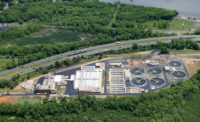An agreement between Florida Power & Light Co. and the Miami-Dade County Commission to work together to address hypersaline groundwater pollution from FPL’s Turkey Point nuclear plant may be too little, too late to resolve pollution concerns.
Under the agreement approved April 10 by the county commission, FPL and the county will work together to build a wastewater treatment plant to supply reclaimed cooling water for Florida Power & Light Co.’s 2,503-MW Turkey Point Power Station. The agreement also calls on FPL to expand solar-energy facilities, build electric-vehicle charging stations and set up battery storage for the Metrorail rapid-transit system.
The 60-million-gallon-per-day wastewater plant is intended to replace a 5,900-acre, unlined system of 168 miles of canals used to cool the plant’s three operating units, including two nuclear units.
The agreement calls for FPL to develop a design and an estimate of the cost of an advanced reclaimed water plant. The joint participation agreement would guarantee reclaimed water installation costs would be shared by FPL and the county. The plant could help the county meet a mandate to reduce the release of wastewater into Biscayne Bay. The county is expected to approve design and technology of the plant in 2019.
The plant could help resolve the problem of hypersalinity that became apparent following a 2013, 208-MW uprate of the Turkey Point plant’s two pressurized-water reactors. After the uprate, salinity and temperature in the canal system spiked. Heavy saline water filtered out through the unlined canal walls and formed a plume of polluted groundwater that migrated westward from the plant in the Biscayne Aquifer, which supplies fresh water to the region. (ENR 3/14/16 p. 8)
To resolve the problem, FPL drilled recovery wells to draw the polluted groundwater back to the plant’s property.
“Our recovery well system that was designed and constructed to recover this hypersaline plume will go into full operation next month,” says Bianca Cruz, a spokeswoman. FPL expects recovery to be completed in about 10 years, in time to meet a state mandate to clean up the saltwater plumes.
But William K. Nuttle, a hydrologist and consultant for the Southern Alliance for Clean Energy, says cleanup of the canals will take more than 60 years and the proposed wastewater plant will be completed too late to help the efforts. He says seepage from the cooling canal system will substantially offset FPL’s gains in removal of polluted groundwater, greatly extending the time required to complete the cleanup operation.
The canal system is part of the operating licenses for the two nuclear units to 2032 and 2033, and will remain in service for at least 15 more years.
FPL has applied to the Nuclear Regulatory Commission for a second 20-year extension for the existing units at Turkey Point. On April 5 the NRC granted licenses to FPL build two new units at Turkey Point, but FPL has no current plans to build them.



Post a comment to this article
Report Abusive Comment